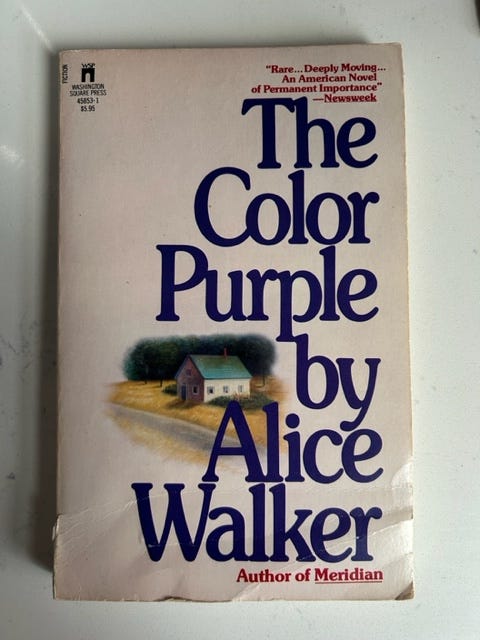Alice Walker is one of the authors the College Board recently removed from its new Advanced Placement African American Studies course, according to reports, but it’s not why I chose her brilliant and powerful novel ‘The Color Purple’ for this week’s review. It’s just an unfortunate coincidence that my editorial calendar aligned with the news. If it were up to me, though, this book, which won the Pulitzer Prize and the National Book Award for fiction, would be in the curriculum.
[Editor’s Note: After initially posting this review, it was brought to our attention the controversy over Alice Walker’s past history with accusations of anti-Semitism and conspiracy theories. Here is an article from Vox that explains the issues.]
Here is the cover:

Celie is a survivor. As a teenager, she is trapped at home in the rural South with an abusive father. She gets pregnant twice, but her father takes the children away, their fate unknown. Then, she’s married off to an older man named Mr. ____ (because, really, he could be any man), who’s not much better, and she is made to raise his children from another relationship. Celie’s sister, Nettie, whom she fears will become her father’s next target, runs away. Celie’s world is one of peril. Lynchings are a constant threat, as are the police and the justice system. (For example, Celie’s friend, Sofia, is forced to work as an indentured servant for more than a decade for the local white mayor and his wife to avoid a prison sentence for talking back to them.) But one of her survival methods is to confide her troubles, hopes and intimate secrets in letters to God, of which the novel is a collection, like:

One day, her husband’s old flame, a glamorous singer named Shug Avery, comes to stay with them to recover from an illness. Celie is inthralled by Shug’s independence and freedom, and her ability to boss her husband around without getting beaten. During her stay, Shug awakens Celie’s own independence as well as a capacity for love and joy. I was fully invested in Celie’s journey. The violence she endures is harrowing, and Walker depicts it unflinchingly, but there also are moments of humor and hope. (I’ll be thinking about the line that explains the book’s title for a long time.) It’s a riveting read, and as I flew through it, I felt like I was with Celie and the other women in the story, learning from them. My mind was expanded like:

I have not yet seen the film adaptation of ‘The Color Purple’ from 1984. It was nominated for 11 Academy Awards, including Best Picture, but didn’t win one. Donna and I look forward to watching it after she’s finished reading the book. In the meantime, I’ve been looking through Giphy for clips from the film. Here’s one of Oprah Winfrey, who was nominated for best supporting actress for playing Sofia, saying the line I quoted in the subject line of today’s newsletter:

If you haven’t read ‘The Color Purple’ yet, you should. I highly recommend it.
How it begins:
You better not never tell nobody but God. It’d kill your mammy.
Dear God,
I am fourteen years old.
I amI have always been a good girl. Maybe you can give me a sign letting me know what is happening to me.Last spring after little Lucious come I heard them fussing. He was pulling on her arm. She say It too soon, Fonso, I ain’t well. Finally he leaver her alone. A week go by, he pulling on her arm again. She say Naw, I ain’t gonna. Can’t you see I’m already half dead, an all of these chilren.
She went to visit her sister doctor over Macon. Left me to see after the others. He never had a kine word to say to me. Just say You gonna do what your mammy wouldn’t. …
Note: The rest of this opening letter is graphic and potentially triggering, so we ended it here.
Who they thanked:
At the end of the book, Alice Walker writes:
I thank everybody in this book for coming.
A.W., author and medium
My rating:

‘The Color Purple’ by Alice Walker was published by Harcourt Brace Jovanovich in 1982 and by Washington Square Press in 1983. 251 pages. $15.81 at Bookshop.org.
What’s next:
Before you go:
ICYMI: Review #202
Hear this: Rosie Robot reached out to us to share her new podcast ‘Alternate Endings: Are You Smarter Than Chat GPT?’ Here’s the description: ‘This is a podcast where we give you two stories. Both stories start with a real paragraph from a classic literary novel. One is an entire actual passage from the novel. The other is written by Chat GPT based on the first paragraph. Can you tell which one is real and which one is written by a robot?’ Donna and I have listened to a few episodes, which are roughly 3 minutes long, and they’re a lot of fun. Some of the titles so far are Bram Stoker’s ‘Dracula,’ ‘Pride and Prejudice’ by Jane Austen and ‘Little Women’ by Louisa May Alcott. Definitely check it out!
Read this: I tried to read the Los Angles Times profile of the woman behind the growing ‘Moms Don’t Have Time to Read Books’ podcast, but then saw this thread about the article by Traci, host of The Stacks Podcast, and read it instead:
 This kind of thing makes me so mad, because there are people in LA doing so much in the book space, many of us are not white and do not center white authors and therefore we are over looked time and time again.A New York bookfluencer launches her first bricks-and-mortar shop ... in L.A. https://t.co/m0xkeBewKU
This kind of thing makes me so mad, because there are people in LA doing so much in the book space, many of us are not white and do not center white authors and therefore we are over looked time and time again.A New York bookfluencer launches her first bricks-and-mortar shop ... in L.A. https://t.co/m0xkeBewKU Los Angeles Times @latimes
Los Angeles Times @latimes
Thanks for reading, and thanks especially to Donna for editing this newsletter!
Until next time,

MPV








The film is also glorious. Highly recommended.
This is an important book, but Walker’s legacy is tarnished for sure. I’m always kind of fascinated when venerable artists adopt bizarre ideas. Idly wondering how much of Walker’s antisemitism is rooted in her divorce from Melvyn Leventhal?